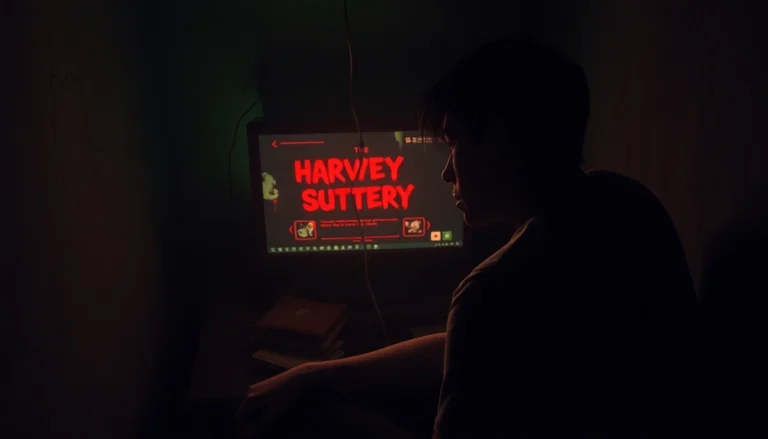
Introduction to BloodMoney: A Psychological Horror Clicker Game
In the landscape of indie horror games, few titles manage to blend psychological depth with visceral gameplay quite like bloodmoney harvey. This dark, unsettling clicker game plunges players into a disturbing moral universe where every click not only offers a chance to earn life-saving money but also chips away at the player’s ethical boundaries. As you navigate this harrowing journey, you are faced with choices that challenge your sense of morality, empathy, and survival instincts. BloodMoney is more than just a game—it’s a visceral exploration of human nature under extreme duress, wrapped in a dark narrative that will linger long after your screen goes dark.
The Harrowing Narrative: Medical Crisis Meets Moral Dilemma
The core of BloodMoney revolves around a deeply personal and urgent crisis: you have been diagnosed with a severe, life-threatening condition requiring an urgent $25,000 for treatment. With time rapidly running out and options limited, the game introduces an eerie character named Harvey—an overly cheerful, seemingly innocent figure who offers an almost surreal solution to your predicament: click on him repeatedly to generate the money you desperately need. This setup immediately establishes a tense moral dilemma, forcing players to consider the cost of survival versus the cost of their morality.
What makes this narrative particularly compelling is how it blurs the lines between innocence and malevolence. Harvey’s bright demeanor contrasts sharply with the increasingly disturbing tools and visuals that become available as the game progresses. The game masterfully heightens this tension by gradually shifting from seemingly harmless clicks to more violent and unsettling options, such as hammers and needles. Each decision feels like a step deeper into a moral abyss, questioning whether the player’s quest for survival justifies the suffering inflicted on Harvey—and, by extension, on oneself.
Gameplay Mechanics and Moral Choices
Clicking on Harvey for Profit
The core mechanic of BloodMoney is deceptively simple: players click on Harvey to generate money. Each click not only increases your funds but also causes Harvey pain, creating an immediate moral conflict. Initially, the process might seem trivial—just a matter of tapping to get the necessary funds—but as the game unfolds, the consequences of each click become more pronounced. Harvey’s reactions grow more distressed, and visual cues such as tears, grimaces, and physical suffering intensify, making players painfully aware of their moral footprint with every interaction.
Upgrades and Increasing Violence
The shop system introduces a disturbing array of upgrades designed to maximize earnings. Early options might include harmless items like pillows, but as your desperation grows, the available tools become increasingly violent—from needles to hammers, and even knives. Each upgrade not only boosts the amount of money earned per click but also deepens the visual and emotional toll on Harvey. The game subtly hints that Harvey may not fully understand the nature of these tools, as evidenced by his surprise reactions to the more violent weapons, which adds another layer of moral complexity. Are you exploiting Harvey’s innocent ignorance, or are you complicit in a darker force manipulating your choices?
Visual and Emotional Design: Creating Unsettling Atmospheres
BloodMoney excels in crafting a deeply unsettling atmosphere that amplifies its narrative tension through visual and auditory cues. As you indulge in the clicker mechanics, Harvey’s appearance and expressions evolve—his cheerful facade gradually disintegrates into fear, pain, and despair. Subtle visual cues, such as trembling hands, tear-streaked face, and a waning smile, evoke empathy and guilt simultaneously. The game’s sound design further heightens the emotional impact, with unsettling ambient noises, distressed murmurs, and Harvey’s increasingly strained voice acting creating a visceral experience.
This design approach forces players to confront uncomfortable feelings—guilt, empathy, and moral conflict—making every decision feel weighty and meaningful. The visual deterioration of Harvey acts as a mirror to the player’s moral decline, especially when violent tools are used to expedite the process of earning money. The atmosphere is intentionally crafted to evoke discomfort, making the player question not just their in-game choices but also their real-world ethical boundaries.
The Moral Complexity of Harvey’s Character
Harvey, the cheerful figure at the heart of BloodMoney, embodies innocence and the potential for kindness. His exaggerated positivity and naivety contrast sharply with the increasingly brutal tools at your disposal, creating a compelling dichotomy. Observant players have noted that Harvey often appears genuinely surprised by the violent weapons, implying he may not understand what is in the shop, expecting harmless items like pillows for pillow fights. This detail introduces a profound moral question: are you exploiting Harvey’s innocence, or is he complicit in a darker game beyond his comprehension?
This ambiguity invites players to reflect on the nature of morality—whether it is black and white or layered with shades of gray. Harvey’s responses and reactions serve as a mirror to the player’s choices—do you minimize his suffering, or do you prioritize efficiency at all costs? The game’s subtle storytelling and visual cues suggest that Harvey might be oblivious or perhaps even a pawn in a much larger, sinister scheme.
Multiple Endings and Player Agency
One of BloodMoney’s most compelling features is its branching narrative, culminating in three distinct endings: The Good Ending, The Normal Ending, and The Bad Ending. These outcomes are shaped by your choices throughout the game—specifically, how much harm you cause Harvey and which upgrades you select to maximize profits.
The Good Ending
Achieved by minimizing Harvey’s suffering, this ending presents a moral victory where you reach your financial goal with the least amount of violence and suffering inflicted on Harvey. It reflects a choice to preserve some semblance of humanity, even in desperation. The visuals are less disturbing, and Harvey’s reactions are comparatively mild, leaving players with a sense of moral integrity and hope.
The Normal Ending
This outcome involves a moderate level of violence, often achieved by using tools like scissors or other less brutal upgrades. Harvey’s suffering is apparent but not overwhelming, providing a more nuanced conclusion that emphasizes the complexity of moral compromise.
The Bad Ending
Here, players maximize profit regardless of the human cost, utilizing the most violent upgrades like the hammer or knife. Harvey’s suffering reaches its peak, and the visuals become increasingly disturbing. This ending serves as a stark reminder of what happens when greed overrides empathy, leading to a bleak and unsettling conclusion.
The game’s design ensures that each playthrough feels meaningful, encouraging players to reflect on their moral choices and consider how different decisions lead to vastly different outcomes. It’s a powerful commentary on human nature and the cost of survival at any expense.
Community Insights and Player Reactions
The BloodMoney community is both intrigued and disturbed by the game’s dark themes and gameplay mechanics. Many players report experiencing genuine emotional reactions—feelings of guilt, empathy, and moral conflict—despite knowing it’s just a game. This emotional impact is a testament to the game’s effective storytelling and design.
Players have shared insights on Reddit and YouTube about subtle details they noticed, such as Harvey’s surprise reactions to violent tools, which suggest he may not fully understand what he is participating in. These observations deepen the moral ambiguity and invite discussion about the game’s underlying themes of innocence and exploitation.
Many gamers appreciate the game’s ability to evoke introspection about real-world issues—such as the ethics of survival, the morality of greed, and the human capacity for cruelty—making it not just entertainment but also a platform for philosophical reflection.
The Broader Implications: Humanity, Morality, and Survival
BloodMoney acts as a mirror to our own society and human nature. It questions whether morality is absolute or flexible when faced with extreme circumstances. The game’s dark narrative prompts players to consider: how far would you go to save yourself or someone you love? Would you compromise your ethics, or would you hold onto your morals, even if it meant risking everything?
The character of Harvey symbolizes innocence, kindness, and the potential for good, yet he is subjected to horrific treatment—highlighting how desperation can corrupt even the purest of intentions. The game explores whether evil is inherent or a product of circumstances, challenging players to confront their own moral boundaries.
By forcing players to make difficult choices with tangible consequences, BloodMoney underscores the uncomfortable truth that survival often requires morally gray decisions. It’s a powerful statement on human resilience and the dark side of human nature exposed under pressure.
Conclusion: How BloodMoney Challenges Ethical Boundaries
BloodMoney stands out as a provocative and deeply unsettling psychological horror game that pushes players to their ethical limits. Its combination of minimalist gameplay, haunting visuals, and layered storytelling creates an experience that is as thought-provoking as it is disturbing. The moral choices—whether to minimize Harvey’s suffering or maximize profits regardless of the human toll—serve as a stark reflection of real-world dilemmas about survival, greed, and empathy.
This game challenges us to question: how far are we willing to go when our own lives are at stake? It asks whether the ends justify the means and whether moral integrity can survive the pressures of extreme desperation. Through its multiple endings and subtle storytelling, BloodMoney invites players to reflect on their own values and the dark corners of human nature that emerge when survival is on the line.
In the end, BloodMoney is not just a game—it’s a mirror held up to society, forcing us to confront uncomfortable truths about ourselves. For anyone interested in psychological horror that combines meaningful narrative with provocative gameplay, BloodMoney is a haunting experience that will linger long after the screen goes dark. Discover more about this dark journey and explore its unsettling universe at bloodmoney.




